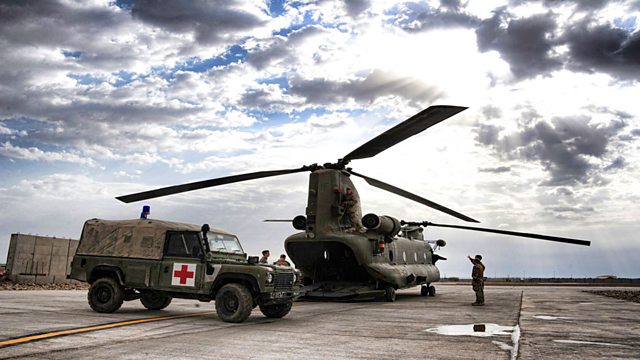Trauma at War
Dr Kevin Fong travels to Afghanistan to meet the medical teams in Camp Bastion and discovers how the hospital there has become the most successful trauma centre in the world.
In the second of two programmes exploring the evolution of trauma medicine, Dr Kevin Fong travels to Afghanistan to meet the medical teams in Camp Bastion and discovers how the hospital there has become the most successful trauma centre in the world - saving the lives of servicemen and women who, in the past, would never have survived their horrific injuries.
They call them "The Unexpected Survivors". The casualties from the war in Afghanistan whose injuries were so severe that they weren't expected to survive, but who survived nevertheless. And since 2009, the number of those survivors has increased to such a level that the standard tools for measuring or scoring trauma injuries as a means of predicting survival, no longer apply. This is part of the medical legacy of ten years in Afghanistan. But how did that come about? And what lessons can be passed on to help casualties in civilian hospitals in the UK and around the world?
Kevin Fong begins at RAF Brize Norton, in Oxfordshire, where, with unique access, he joins medical teams on a week-long training course for MERT - the Medical Emergency Response Team service that operates from a Chinook helicopter in Camp Bastion. More than just an air ambulance, the MERT is a mobile resuscitation unit, flying nurses, paramedics and for the first time in modern warfare, doctors right into the heart of battle to rescue and treat casualties soon after injury.
One of those is doctors is Surgeon Commander Dr Kate Prior who first trained to go ou to Afghanistan in 2009 when the fighting was at its fiercest: "it was busy, we knew it was busy and the MERT was going out several times a day. We we were seeing an awful lot of amputations, patients who'd lost one leg, two legs, sometimes two legs and an arm. And so I knew what to expect. But nothing prepares you for the first real casualty that you see".
MERT is impressive but it is only one link in the chain of care so to discover how the system operates as a whole, earlier this year Kevin travelled to Camp Bastion in Afghanistan with one of the last medical teams to deploy out there on Operation Herrick 19. Now as military medics return to the UK, can success on the front line translate to the emergency departments on the home front?
Last on
More episodes
Previous
Next
You are at the last episode
Broadcast
- Tue 9 Dec 2014 16:00Βι¶ΉΤΌΕΔ Radio 4

